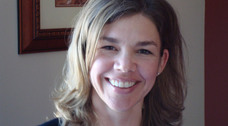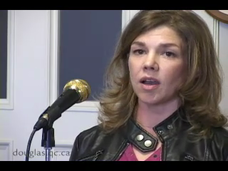2009-07-16

A new facility for the Douglas, timely
"When I started working at the Douglas it was one of those ironic coincidences that life brings your way," says Kimberly Eyquem. She had just lost her 38-year-old brother who suffered from mental illness most of his adult life to suicide.
Kimberly joined the Douglas as a Communications Consultant three years ago to assist with the efforts to secure an okay from the government to build a new facility. It was following the naming of the Douglas as an official university institute in 2006 that the hospital really started to take a serious look at their 130-year-old infrastructure and the need to have a modern facility to fulfill the new mandate.
Successful professional path leads to a profound life
With a professional life that started in communications and policy at the Provincial legislature in the late 80s in Saskatchewan, Kimberly was more than ready to take on her role at the Douglas. She then went to work with two different municipal lobbying organizations, first in Saskatchewan and then in Ontario. In both functions she represented the interests of municipal government to the provincial government. This involved looking at all kinds of different laws and regulations and circumstances to invoke positive change. She eventually went to work for a public relations firm in Toronto. Kimberly stuck with what she was good at: providing strategic leadership on big issues for both public and private sector organizations, with a focus on healthcare.
By her early 30s Kimberly was a successful career woman. "I was working in a management capacity, I had a big staff, a big budget, prestige but somehow it wasn't gratifying on a personal level," she says. "I realized that I had come to a place in my life where it had become very important to make a positive contribution that went beyond my own personal and financial gain and status. So I took some time off and when I came back to work I worked for a humanitarian organization as a communications manager for a lot less money. I was probably making about half of what I was making before and I had a lot less status but it was a really positive experience. Following that I had my family – I have two children. And when I returned to the workforce again I decided I would carry on with having that element of doing something positive with my experience and with my professional life"
As fate would have it, Kimberly ended up at the Douglas. She had lost her brother to suicide in February 2006 and less than a year after she was offered the job.
Loss breeds hope
Following the death of Kimberly's brother her family made a pact that they would talk about his suicide whenever it would help others and within their own capacity to do so. Kimberly's mom and step dad have worked as lay counselors with people who have lost children to suicide and they talk one on one to people very freely about their experience. Her mother has also spoken to small groups who deal with grief counseling. Kimberly has spoken to the media on occasion and she speaks freely to anybody who wants to know about suicide – who needs to hear about it. Most recently she told her story during the book launch of Monique Séguin, PhD, of Douglas Institute's McGill Group for Suicide Studies, who wrote "Le suicide : le comprendre pour le prévenir".
"My life experience is not worth anything if I don't share it," says Kimberly. "If I can help or comfort just one person it is a good thing. Then it is worthwhile."
Kimberly feels proud to be working on a project that will benefit people living with mental illness. The new facility will not only provide a healing environment by having single rooms, lots of lighting, and better soundproofing and physical layout among many other improvements, it will also provide an enriching platform for teaching and research. Kimberly is working hard at making a difference for future generations of people living with mental illness. Hope keeps her strong. J.A.
In a Word or Two…
What words best describe mental illness?
A distortion in the perception of one's self or one's circumstances that is sufficiently powerful to seriously disrupt one's ability to engage healthily in life and in human relationships.
What film has most influenced your thoughts on mental health?
Girl Interrupted - it was the first film I saw that addressed the less 'intense' or stereotypical forms of mental illness, and it made me realize that it was something that could affect anyone, regardless of their gender, age or circumstance.
How do you maintain a balanced lifestyle?
I work hard at putting my family first, and maintaining close ties with people and interests that nourish 'non-work' aspects of life. And I try to laugh as much and as often as possible.
Who is doing outstanding work in destigmatizing mental illness?
The Douglas has really been an innovator in bringing mental illness into the mainstream through programs like the Mini-Psych and Frames of Mind. I also really appreciate the work that CAMH has done to destigmatize mental illness.
In 125 years, will the Douglas still be here?
I would say yes, in one form or another - I find it difficult to believe that, even in 125 years, we'll know all there is to know about the human brain.
One word that describes the Douglas?
Hope



